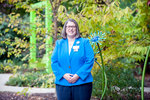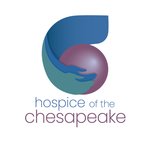Clear, 72°
Wind: mph,


At Hospice of the Chesapeake, people get medical care, they get support, and they get counseling. But maybe the most important thing they acquire is hope.
Since Hospice of the Chesapeake was founded in 1979 — originally under the name Arundel Hospice — the nonprofit, independent community-based organization has given people hope as they or their loved ones navigate the journey of illness and loss.
“People say, ‘I’m not ready to give up hope yet’ before they consider hospice,” said Becky Miller, chief clinical officer for Hospice of the Chesapeake. “Today at Hospice, there are 649 people who all have hope. The change is in what they hope for.”
The nonprofit’s continuum of care services includes hospice, supportive care and grief care. Throughout this care, Hospice of the Chesapeake’s team works to address the physical, intellectual, emotional, social and spiritual needs.
“We not only come from the community, but that’s also who we give back to,” Miller said. “We have a board of directors, as opposed to a for-profit that has stakeholders. Our decisions are based on what is going to serve the family the best … in contrast, a for-profit hospice is going to ask, ‘What’s the return on investment?’”
The best situation depends on each family, but many people prefer to age in place, living independently in their own home. Hospice of the Chesapeake cares for patients wherever they call home — private residences, nursing homes, assisted living facilities or hospitals.
Making that possible is the care team of physicians and nurse practitioners who specialize in the care of people with advanced illness. They help people manage pain and other difficult symptoms while also defining the goals of care.
“Hospice is the tail end of palliative care,” Miller said. “We put together a treatment plan to help them stay at home and focus on whatever brings them joy.”
Miller, who has a background in social work, knows firsthand the importance of having a treatment plan and a team of hospice professionals collaborating.
“My father was very ill, and he was seeing a pulmonologist, an oncologist and a primary care doctor,” Miller said. “Every one of those people are experts in their field, but no one was looking at [my father’s care] across the board. It wasn’t until my father met the palliative care physician that he truly understood what was happening with his health.”
The care team works together to determine what is causing people the most distress and how to mitigate those factors.
“For example, someone who has difficulty breathing and the medicine or inhalers they used to take are not working in the same way, so they can’t go for a walk,” Miller said. “Does that person need oxygen so they can get back to going for walks?
“It’s a very creative process,” Miller said. “It’s so tailored to each individual person. I think for our team at the bedside, that’s one of the most rewarding points. It’s like a puzzle, trying to figure out how it fits together for each individual person.”
Those who need a more intensive level of care, as an alternative to hospitalization, can be brought to the Rebecca Fortney Inpatient Care Center, located on the John & Cathy Belcher Campus in Pasadena. The 14-suite facility offers families and patients serene spaces, including a sanctuary, in which to gather with loved ones. A cozy family room, children’s play space and family kitchen offer the comforts of home. Each patient’s room opens to a peaceful garden setting.
Hospice of the Chesapeake also guides veterans toward a peaceful ending. Through its We Honor Veterans program, Hospice of the Chesapeake pays respects to veterans and their families while helping them through their life stories.
The nonprofit’s mission includes helping caregivers and family members. Through its grief support team, Chesapeake Life Center, the organization offers grief support, and preventative mental health and coping skills that people can use throughout their lifetime.
“People adjusting to loss have to put into context what this means and how to cope with the loss, stress, anxiety, as well as the loss of independence,” Miller said.
For patients, illness can conjure different fears and challenges of navigating the health system. One of the questions families ask most frequently is how to pay for hospice, which is most often covered by insurance. Miller explained that the organization is here to help anyone in need, regardless of financial status.
“We don’t turn anyone away,” Miller said. “If they need our service, we’re here to serve them.”
Miller emphasized that hospice does not make people sicker and that it’s never too early to explore it as an option once a person receives a serious diagnosis.
“People always say, ‘I’m not at that point.’ You don’t have to be at a point,” Miller said. “Most of the time, people come when they’re having a crisis. We’re always a phone call away. To increase the quality of their life, we would like to help people earlier in their journey.”
Regardless of their illness, people can always have hope.
“What patients and families are hoping for may be different from day to day,” Miller said. “But no one gives up hope. There is always something to hope for.”
Hospice of the Chesapeake has facilities in Anne Arundel, Calvert, Charles and Prince George’s counties. To learn more, call 410-987-2003 or 1-877-462-1101 (toll-free), or visit www.hospicechesapeake.org.
Comments
No comments on this item Please log in to comment by clicking here